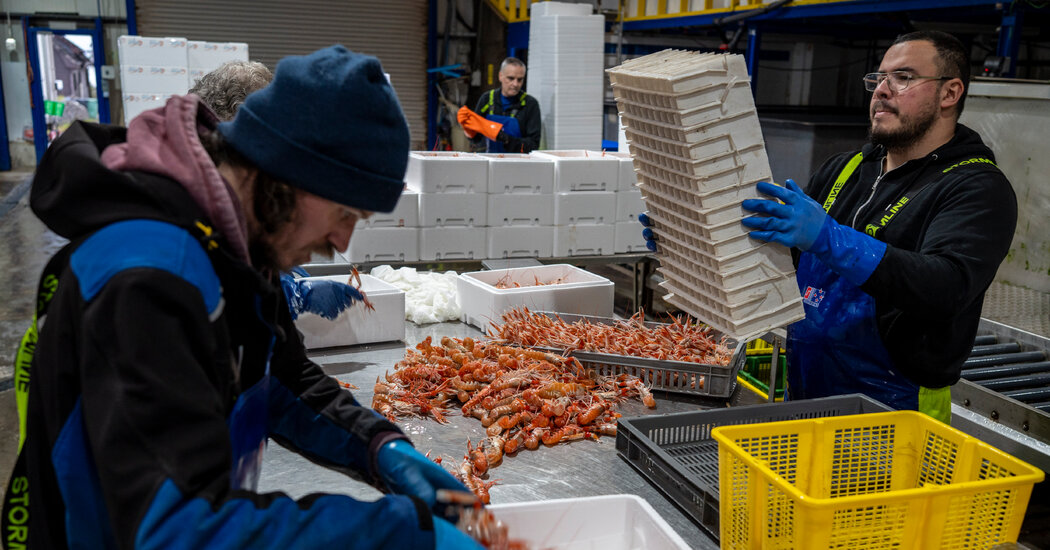Late into the evening, five men were busy in a shellfish processing facility in northwest Scotland, sorting live langoustines and packing them into polystyrene boxes to be trucked to France, Italy or Spain.
At busy times of the year, Scot West Seafoods could employ twice as many staff at the facility, if only the company could recruit them, its operations manager said.
“We know that we are in a faraway place,” said Xohan Dios, the manager reflecting on the location of Kyle of Lochalsh, a village nestled in a remote region of imposing hills and scenic lakes. “The only thing we need is people.”
Because of the lack of workers, Scot West Seafoods has stopped processing prawns at the facility, in far northwest Scotland, which lies close to a bridge leading to the Isle of Skye. It has also considered moving its packing operations to Glasgow, a four-hour drive south, where workers would be easier to recruit.
In Britain, as in many western countries, anti-immigration sentiment is on the rise. Reform U.K., the right-wing populist party led by Nigel Farage, has surged ahead of the governing Labour Party in opinion polls and has said it would deport 600,000 undocumented immigrants if it wins power. Alarmed by Reform’s advances, Prime Minister Keir Starmer has announced a series of measures to curb the number of legal and illegal migrants arriving in Britain.
Scotland’s population is rising overall, but in some regions, a labor shortage is crippling companies and leaving communities without essential workers, while rural schools are being forced to close as residents leave. The contradiction between the British government’s desire to cut overall immigration by hundreds of thousands of people a year, and the scarcity of workers in some rural areas, has created a dilemma for Scotland’s lawmakers.
Scotland’s first minister, John Swinney, warned in May that the British government’s restrictive approach to immigration posed “a significant economic threat” to Scottish prosperity, adding that the system of care for the elderly and other vulnerable people was at risk. One Scottish lawmaker from Britain’s governing Labour Party, Torcuil Crichton, has called for a new system of work visas for migrants employed in remote areas.
Mr. Dios said several factors were behind the recruitment problems, including a lack of affordable housing for workers; the impact of Brexit, which ended the automatic right to recruit freely from the European Union; and the Covid-19 pandemic, which prompted many migrants with the right to work in Britain to return home.
“Everybody is looking for employees,” he said. “You talk to the hotel owners or to the managers of restaurants or coffee shops or the fishing boats — everybody’s in the same situation.”
A surge in legal immigration to Britain from outside the E.U. in the years after Brexit led to arrivals exceeding 900,000 in a 12-month period ending June 2023. But the then-Conservative government took steps to cut the numbers, which fell to around 430,000 in the 12 months of 2024.
“The whole of rural Scotland faces a depopulation crisis,” said Mr. Crichton, the lawmaker, who represents Na h-Eileanan an Iar, or the Western Isles. Some factories in his constituency struggle to recruit, he said, and some restaurants open only from Thursday to Sunday because of a lack of staff. “We need to counter — with Labour values — this myth that Britain is somehow full up,” he said. “The economy in some sectors is running at half speed because of the lack of a labor force.”
Mr. Crichton blamed housing scarcity, poor transportation links and limited health care provision for the exodus of younger people from his area. At 26,200, the population of the Western Isles is 5.5 percent lower than it was in 2011.
Depopulation is increasing as families struggle to find child care, prompting more to move away. Since 2007, 147 rural schools have closed, according to the Scottish government, which last year published a strategy to tackle the issue.
The Scottish government, which is based in Edinburgh and has power over issues like health care, transportation and some elements of taxation, would like to have control over immigration in its territory, too.
That is currently determined in London where the government controls migration policy for the whole of the United Kingdom.
Mr. Swinney’s governing Scottish National Party, which supports independence for Scotland from the U.K., has proposed a special visa for migrants wanting to work there. This could include a rural visa pilot program which, for the first four years, would restrict the place of employment to a specific area, and a Scottish graduate visa, allowing students to live and work in Scotland for two years after concluding their studies.
But with Reform U.K. consistently ahead in the polls, there is little appetite in London for any of these initiatives. When asked in a parliamentary debate last year about Mr. Crichton’s proposals for work visas restricting migrants to rural areas of Scotland, Seema Malhotra, then a minister in the Home Office, said there was “currently no legal basis to do so, even if we wanted to.” And while Mr. Farage once faced a hostile reception in Scotland, Reform U.K. is now supported by around a fifth of Scottish voters according to some recent polls.
On the island of South Uist, one of the Western Isles, Sheila Peteranna, manager of the Borrodale Hotel, said she struggled to recruit young workers in a remote location with an unreliable ferry link to the mainland. “They don’t want to live on the island because they want to get away to attend a concert, to see a show, to go to the football — what normal people do,” she said. “They want to be the same, and you don’t blame them at that age.” Her two adult children, she added, plan to move to the mainland.
Like other parts of Scotland, South Uist has long been influenced by migration. Ms. Peteranna’s own family descended from a migrant who was shipwrecked there, probably in the eighteenth century.
The area in which she lives has also struggled to find highly educated professionals such as medical staff. Last year it recruited five family doctors but had to offer an annual salary package worth 150,000 pounds to 160,000 pounds (about $198,000 to $210,000), tens of thousands more than the standard pay for that role in Scotland.
At Scot West Seafoods, one of the employees, Andrew Powrie, 40, said a shortage of housing was the biggest local problem. “It’s nigh on impossible for anyone to own their own house because it’s so expensive,” he said.
He noted that on the scenic Isle of Skye, where he lives, landlords get much better returns by renting to tourists. “On the whole for locals, it’s just a nightmare,” he said. Most young people, he added, “seem to want to go to college and then straight down to Glasgow, Edinburgh or Aberdeen, because there’s not a lot of opportunities for them here.”
Stephen Castle is a London correspondent of The Times, writing widely about Britain, its politics and the country’s relationship with Europe.
The post In Some Parts of Scotland, ‘The Only Thing We Need Is People’ appeared first on New York Times.




